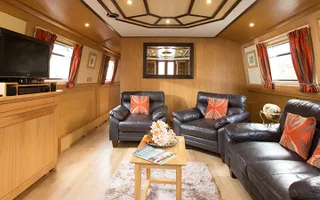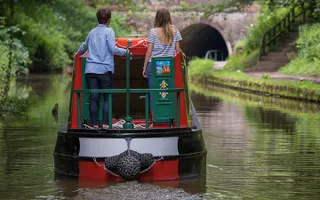Your boat must be in excellent condition and repair if you intend to use it as a hotel. We may ask for photographs or we may come out to inspect it.
You will need a permanent mooring with facilities such as fuel, water, sewage disposal, commercial waste disposal, secure customer parking and a safe place to board the vessel.
Whether it is possible to operate a boating business using any of the Trust facilities in addition to your home mooring, depends on the type of business and will be assessed on case by case basis (and only for single craft). If it is possible, a separate agreement and fee may be applicable.
You should also detail all of your proposed pick up and drop off points. We may occasionally give our consent to use visitor moorings for this purpose, but there will be an additional charge for this.
If you intend to cruise for the whole of the season in accordance with a pre-published schedule that complies with the guidance for Boaters without a Home Mooring we will not require you to have a home mooring. In these cases you may use the Trust's facilities as you cruise.
You may also need to provide parking and have good vehicle access to the boat so that you can restock any food and drink items you sell on board.
If your boat will remain statically moored in one place please refer to our guidance for a Fixed Location Trading Boat.
We will assess your proposal for impact on local navigational safety, water resource and other operational matters. You should include details within your online application to enable us to do this.
Do not commit financially to your proposed business before receiving our ‘in principle' approval.
Regulations
As advised above if you intend to cruise for the whole of the season in accordance with a pre-published schedule that complies with the guidance for Boaters without a Home Mooring we will not require you to have a home mooring.
A number of boaters have asked for clarification of the legal requirement to cruise throughout the period of their licence and, in particular, what is the minimum distance that should be covered in order to comply with the Trust's Guidance for Boaters without a Home Mooring. For further details please refer to this page
Insurance
You will need to obtain Third party and Public Liability Insurance cover provided by a company that is authorised and regulated by the Financial Conduct Authority which covers liabilities of at least two million pounds for each claim.
You must provide us with evidence that you are insured for your proposed activities on application.
The Roving Canal Traders Association has some recommended insurance companies in case your current boat insurance providers are unable to assist with a commercial insurance extension.
You will need an MCA Class V Passenger Certificate if you carry 13 or more passengers. You will need to contact your [local MCA office] for detailed advice about this.
If you carry 12 or fewer passengers you will need a Non-private boat safety scheme certificate an a declaration of compliance with the Small Passenger Boat Code.
A copy of the Regulations checklist for each sector can be downloaded here.
Boat licence
All our price list can be found on our fees, terms and conditions page. Or you can use our online calculator to find your licence price.
When the business boating manager has confirmed that your Operating Proposal is acceptable, they will confirm by email and you can then to apply for the business Licence online within your MyTrust account.
Mooring
Whether it is possible to operate a boating business from any of the Trust's waterside mooring sites depends on the type of business it is.
If it is possible, an uplift on the mooring agreement fee may be applicable. You will also require a suitable business licence.
Further details are available on our waterside mooring webpage.
If you're thinking of using your boat to run a business or commercial activity, or are hoping to secure a mooring to start a boating business or commercial activity, the information below will help you with your planning:
Commercial / Business Use Application Form
Explanation of Commercial Use Table and Tariff
Boater's Handbook
We have now launched a new edition of the Boater's Handbook in partnership with the Environment Agency.
First published in 2002, the handbook is written for boat owners and hirers and contains lots of 'getting started' tips, as well as important information about how to boat safely.
The updated handbook contains some new information on waterway dimensions. There are also pointers on the extra factors owners and hirers of wide beams need to be aware of when navigating and mooring.
The Handbook was originally commissioned by British Waterways in partnership with the Environment Agency and the British Marine Federation. An expert group was commissioned to develop key messages and content, drawing on other published sources and relevant empirical evidence. Since then, there have been several re-prints which incorporated best practice updates.
Download it below, or order a free hard copy from the online shop.





